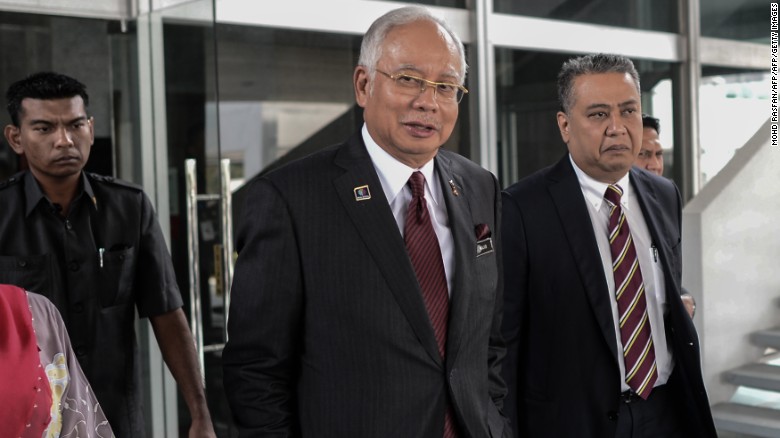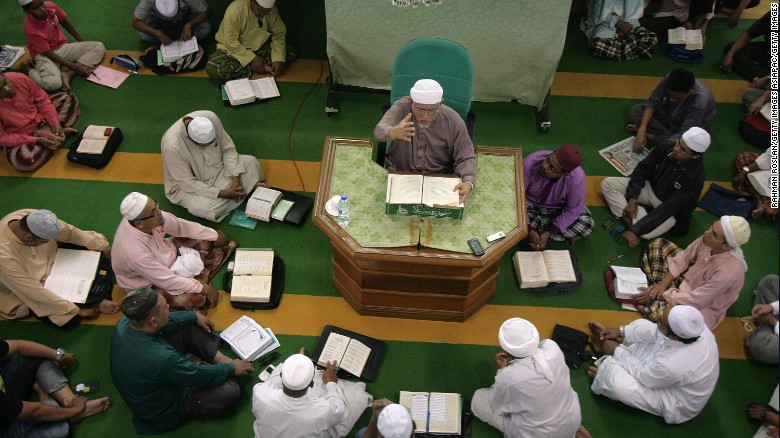Push for hudud law raises tensions in Malaysia
A proposal in Malaysia's Parliament to introduce the strict Islamic penal code known as hudud law is threatening to split the country's government apart.
The proposed bill was introduced in parliament last Thursday by Abdul Hadi Awang, the president of the country's opposition Pan-Malaysian Islamic Party.
It will be debated in October and, if passed, will replace current provisions in the country's Sharia courts -- which govern Muslims -- with harsher hudud punishments. Hudud law allows for penalties such as amputation of limbs and stoning.
The tabling of the bill was made possible with the support of the United Malays National Organization (UMNO), the majority party that makes up the ruling Barisan Nasional coalition. Prime Minister Najib Razak has been trying to calm the uproar that has erupted since the tabling of the proposal, denying that the bill will lead to the full implementation of hudud law.

Malaysian Prime Minister Najib Razak
"I would like to state that it's not for the implementation of hudud. It's just to give the Sharia courts enhanced punishments. From six-strokes caning to a few more," he said, in an interview with local media.
However, non-Muslim component parties of Najib's ruling Barisan Nasional coalition government -- which has led the nation since its independence in 1957 -- have formed a consensus decrying it.
One of these parties is the Malaysian Indian Congress, whose president, S. Subramaniam, in a statement, called it "inconsistent with the Federal Constitution."
"The MIC is of the view that the proposed bill is inconsistent with the provisions of the Federal Constitution, which protects the rights of all Malaysians for equal treatment before the law and against the duality of sentencing."
Sim Kui Hian, president of the Borneo-based Sarawak United People's Party, is also opposing the bill, saying all signatories to the forming of Malaysia in 1963 agreed that the country would be run by a secular government.
"The passing of the bill could motivate Sarawakians to part ways with Malaysia," he said. A huge proportion of the population in East Malaysia are non-Muslims, as opposed to the peninsular where the majority are Malay Muslims.
Malaysia's Transport Minister, Liow Tiong Lai, and Minister in the Prime Minister's Department, Mah Siew Keong -- both of whom are non-Muslims -- have threatened to quit Prime Minister Najib Razak's Cabinet if the bill is passed in Parliament. Subramaniam has also vowed to resign as minister should the bill be passed.
'Political strategy to gain Muslim support'
Meanwhile, former law minister Zaid Ibrahim -- a noted critic of the Najib administration -- says this is a clear sign that the idea of democracy and rule is changing in the country.
"Islam is defined by those in authority, and they define it however they want. This is all political and the corrosive effect is going to be in the long term.
"There is growing conservatism in the country and it is driven by politics. It used to be very subtle but now it is getting bigger," said Zaid.
Zaid believes allowing the hudud bill to be debated in Parliament is a political strategy by Najib, to garner the Malay-Muslim support.
Those advocating hudud law in Malaysia argue it will be applicable only to Muslims and not affect non-Muslims. However, Chandra Muzaffar, the president of non-governmental organisation, The International Movement of a Just World, says the implementation of hudud will create an unjust dual legal system.
"If you commit a wrongdoing, your punishment cannot be different from another person. You have to be fair. If two people people commit robbery, one gets his hand chopped off and the other doesn't, it isn't right," he said.
He cited a hypothetical example of a Muslim man caught for raping a non-Muslim woman.
"Under hudud, the authorities will need to be presented with four male Muslim witnesses and the rapist can argue that he be set free if they are even short of one. Can you imagine the reality that the non-Muslim victim has to face even if the rape can be proved through DNA testing?" he explained.
Muslim Conservatism in Southeast Asia
There have been several cases in Malaysia that have seen conflict between the civil and Sharia courts.
One of the most noteworthy has been been the case of Indira Gandhi, a Hindu. Her ex-husband converted to Islam, unilaterally converted their three children and ran away with them in 2009. The case went on for years, with the constant argument being whether it should fall under the jurisdiction of the civil or Sharia court. Indira eventually won the case after the High Court granted her full custody of her children and annulled their conversion to Islam in 2013.
Muslim conservatism is growing in Southeast Asia. Over the last few years, Brunei and the Indonesian province of Aceh has seen hudud and Sharia laws introduced.
Aceh implemented Sharia law in 2001. While it originally only applied to Muslims, a by-law came into force late last year, allowing for it to be applied to non-Muslims as well. In April 2016, a 60-year-old Christian woman was whipped nearly 30 times for selling alcohol. It was the first time a non-Muslim was punished under Sharia in Aceh.
Brunei, meanwhile, implemented Sharia and hudud law in 2014.
News Courtesy: www.cnn.com











